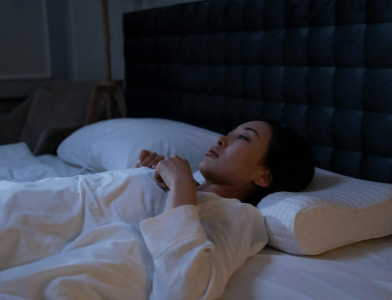Could insomnia raise your dementia risk? What new research reveals
By
Veronica E.
- Replies 0
Disclaimer: The information provided in this article is for educational purposes only and is not intended as a substitute for professional medical advice, diagnosis, or treatment. Always consult your physician or other qualified healthcare providers with any questions you may have regarding a medical condition or before making any changes to your health regimen.
Many of us know the frustration of lying awake at night, staring at the ceiling, or replaying the day’s events over and over.
Occasional sleeplessness happens to everyone, but when it becomes a pattern, the consequences may be more serious than just daytime fatigue.
A growing body of research suggests that chronic insomnia could be tied to long-term brain health, including higher dementia risk.
For older adults already balancing multiple health concerns, these findings serve as an important reminder of just how vital sleep is for cognitive function.
The good news? Experts say there are practical steps you can take to protect both your rest and your memory.

A recent study published in Neurology followed 2,750 cognitively healthy adults, with an average age of 70, for more than five years.
The researchers found that those with chronic insomnia—defined as difficulty falling or staying asleep at least three nights a week for three months—were 40% more likely to develop mild cognitive impairment or dementia compared to good sleepers.
In numbers, 14% of insomniacs developed cognitive issues, compared with 10% of those who slept well.
Researchers also noted that the brains of insomniacs appeared to age about 3.5 years faster.
During deep sleep, the brain clears away waste products, including amyloid plaques linked to Alzheimer’s disease.
Sleep also helps regulate blood pressure, blood sugar, and heart function—all essential to brain health.
Without enough deep sleep, harmful proteins and inflammation can build up, blood vessels may be damaged, and long-term memory and thinking skills can decline.
Experts caution, however, that the relationship is complex: dementia itself can disrupt sleep, and health conditions like depression or chronic illness may also play a role.
Some people assume sleepless nights are inevitable as we get older, but doctors say that’s not true.
While sleep patterns may change—lighter sleep and earlier wake times—persistent insomnia is not a normal part of aging.
In fact, misjudging how much sleep you really need can create unnecessary worry.
As neurologist and sleep expert Dr. W. Christopher Winter notes, most adults don’t require excessive hours of sleep, and sometimes the problem lies in mismatched expectations rather than actual insomnia.
If you’re struggling with ongoing sleep issues, experts suggest these steps:
1. Talk to your doctor. A sleep specialist can identify underlying causes, such as sleep apnea, stress, or medication side effects.
2. Practice good sleep hygiene. Keep a regular bedtime, avoid screens before bed, and create a dark, cool, quiet sleep environment.
3. Watch your habits. Avoid caffeine and heavy meals late in the day, and limit daytime naps to no more than 30 minutes.
4. Stay active. Daily movement helps promote deeper sleep, especially if exercise is done earlier in the day.
5. Manage stress. Relaxation techniques, meditation, or journaling can help calm a busy mind.
6. Consider therapy. Cognitive Behavioral Therapy for Insomnia (CBT-I) is an effective, non-drug treatment option.
7. Be careful with sleep aids. Medications may provide short-term help but are not a long-term solution, particularly for older adults.
Sleep is one of the most important—and most overlooked—tools for maintaining brain health.
While more research is needed to fully understand the insomnia-dementia connection, making small changes to improve your rest can support sharper memory, better focus, and healthier aging.
Read next: Are these strange sensory changes a clue to Dementia? Experts say you shouldn’t ignore them

Do you struggle with sleep, and if so, what helps you get the rest you need? Have you tried any tips or therapies that worked for you? Share your experiences in the comments and help other members of The GrayVine community find better sleep.
Many of us know the frustration of lying awake at night, staring at the ceiling, or replaying the day’s events over and over.
Occasional sleeplessness happens to everyone, but when it becomes a pattern, the consequences may be more serious than just daytime fatigue.
A growing body of research suggests that chronic insomnia could be tied to long-term brain health, including higher dementia risk.
For older adults already balancing multiple health concerns, these findings serve as an important reminder of just how vital sleep is for cognitive function.
The good news? Experts say there are practical steps you can take to protect both your rest and your memory.

Researchers are finding strong links between poor sleep and long-term brain health. Image source: Pexels / cottonbro studio.
The surprising link between insomnia and dementia
A recent study published in Neurology followed 2,750 cognitively healthy adults, with an average age of 70, for more than five years.
The researchers found that those with chronic insomnia—defined as difficulty falling or staying asleep at least three nights a week for three months—were 40% more likely to develop mild cognitive impairment or dementia compared to good sleepers.
In numbers, 14% of insomniacs developed cognitive issues, compared with 10% of those who slept well.
Researchers also noted that the brains of insomniacs appeared to age about 3.5 years faster.
Also read: What if everything you know about sleep is wrong? How a scientist finally cured his insomnia
Why poor sleep strains the brain
During deep sleep, the brain clears away waste products, including amyloid plaques linked to Alzheimer’s disease.
Sleep also helps regulate blood pressure, blood sugar, and heart function—all essential to brain health.
Without enough deep sleep, harmful proteins and inflammation can build up, blood vessels may be damaged, and long-term memory and thinking skills can decline.
Experts caution, however, that the relationship is complex: dementia itself can disrupt sleep, and health conditions like depression or chronic illness may also play a role.
Also read: Struggling to sleep through the night? Avoid these 5 foods and drinks at all costs
Is poor sleep just part of aging?
Some people assume sleepless nights are inevitable as we get older, but doctors say that’s not true.
While sleep patterns may change—lighter sleep and earlier wake times—persistent insomnia is not a normal part of aging.
In fact, misjudging how much sleep you really need can create unnecessary worry.
As neurologist and sleep expert Dr. W. Christopher Winter notes, most adults don’t require excessive hours of sleep, and sometimes the problem lies in mismatched expectations rather than actual insomnia.
Also read: Are you eating dinner at the wrong time? The best hour for better sleep (plus 2 snacks that help)
What to do if insomnia is a problem
If you’re struggling with ongoing sleep issues, experts suggest these steps:
1. Talk to your doctor. A sleep specialist can identify underlying causes, such as sleep apnea, stress, or medication side effects.
2. Practice good sleep hygiene. Keep a regular bedtime, avoid screens before bed, and create a dark, cool, quiet sleep environment.
3. Watch your habits. Avoid caffeine and heavy meals late in the day, and limit daytime naps to no more than 30 minutes.
4. Stay active. Daily movement helps promote deeper sleep, especially if exercise is done earlier in the day.
5. Manage stress. Relaxation techniques, meditation, or journaling can help calm a busy mind.
6. Consider therapy. Cognitive Behavioral Therapy for Insomnia (CBT-I) is an effective, non-drug treatment option.
7. Be careful with sleep aids. Medications may provide short-term help but are not a long-term solution, particularly for older adults.
Also read: Could this one overlooked issue raise your dementia risk? New study says yes
The bottom line
Sleep is one of the most important—and most overlooked—tools for maintaining brain health.
While more research is needed to fully understand the insomnia-dementia connection, making small changes to improve your rest can support sharper memory, better focus, and healthier aging.
Read next: Are these strange sensory changes a clue to Dementia? Experts say you shouldn’t ignore them
Key Takeaways
- A new study found that older adults with chronic insomnia were 40% more likely to develop mild cognitive impairment or dementia.
- Insomnia was linked to faster declines in thinking and memory, equivalent to about 3.5 years of brain aging.
- Experts stress that while insomnia is associated with dementia risk, it does not directly cause it, and other health factors play a role.
- Doctors recommend practical steps such as improving sleep hygiene, managing stress, seeking therapy, and consulting a specialist if problems persist.
Do you struggle with sleep, and if so, what helps you get the rest you need? Have you tried any tips or therapies that worked for you? Share your experiences in the comments and help other members of The GrayVine community find better sleep.






